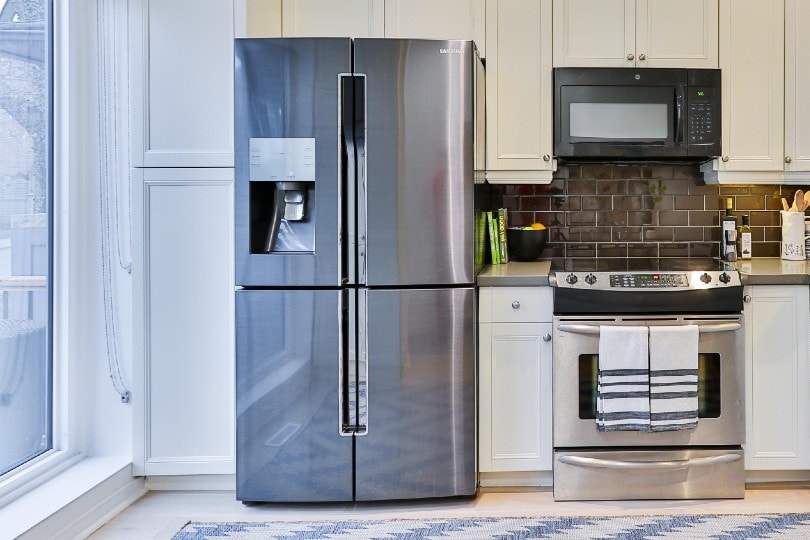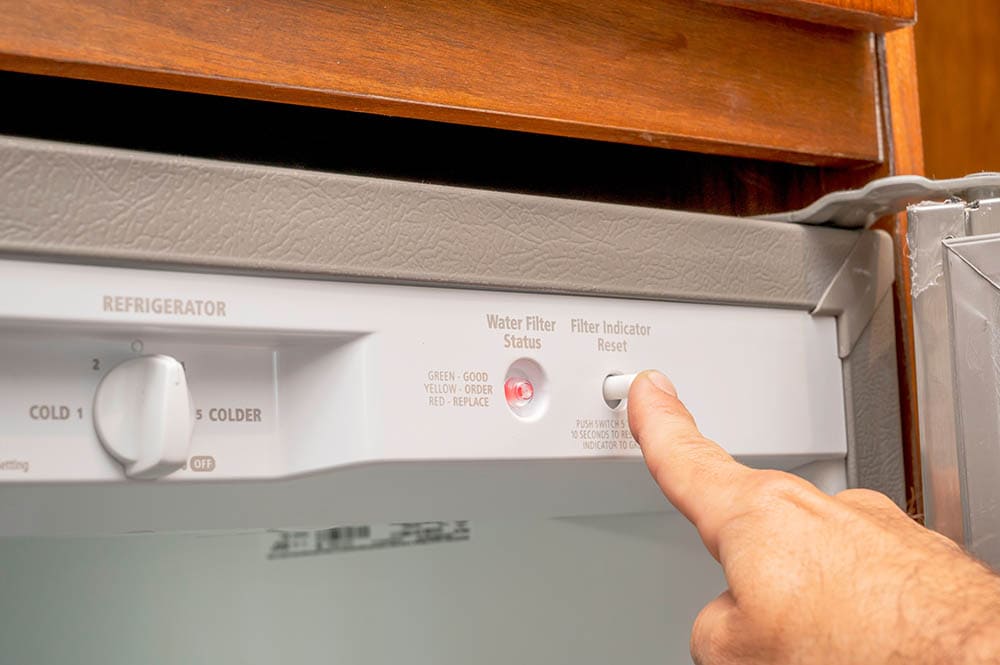How Many Watts Does a Refrigerator Use? Do They Consume Lots of Power?
-
Pete Ortiz
- Last updated:

Refrigerators are one of those household appliances that operate the entire day. But fortunately, it doesn’t consume lots of power every day. The average power a refrigerator uses ranges between 200–800 watts, depending on the model, manufacturer, and duration it’s been used.
Traditional refrigerators have a running wattage of about 200-watt hours a day. Meanwhile, their starting wattage is about 800–1200 watt-hours a day. Compared with other household appliances, this power consumption isn’t a lot.
Nowadays, most refrigerators have energy labeling showing their wattage or voltage and amperage. If the wattage isn’t mentioned, you can calculate it with the amperage and voltage. Let’s get into more details to save money on our energy bills.
What to Consider When Calculating a Refrigerator’s Wattage

Refrigerators run on an on-and-off cycle the whole day. This means they have a lower running wattage than the figure mentioned on their label. Unfortunately, this makes estimating the appliance’s actual power usage challenging.
According to the US Department of Energy stats, most refrigerators operate on maximum power for only 8 hours a day or ⅓ of their running time. But this figure may not work for every refrigerator due to a few factors, such as:
The Amount of Time Your Fridge Stays Open
If you live with an extended family, your appliance will likely stay open for longer. The situation could even be worse if you have many kids at home. That’s because these tiny humans love to open the refrigerator door just for fun!
If that’s the case, the appliance would require more time and energy to start cooling again. It will take more running time, ultimately increasing power consumption.
Outside Temperature
Placing your refrigerator in a warm corner of your home may take a long running time to maintain the desired coolness. On the other hand, if it’s in a cooler place, it will run fine on less power and maintain the optimum temperature.
The same applies to the seasons. Refrigerators run less in colder climates and more in warmer seasons.
Inside Temperature
Refrigerators allow users to increase and decrease their inside temperature. If you keep the setting low, the appliance will consume more energy. In contrast, moderate or higher temperatures may use less energy.
Built-in Freezers
If your refrigerator has a freezer, your appliance may run longer and consume more energy than a fridge. However, both refrigerator parts generally consume the same amount of power. That’s because freezers occupy less space despite consuming more power to maintain their temperature.
How to Calculate Your Refrigerator’s Wattage

Your electricity bill measures the total power consumption in kilowatt-hours (kWhs). So, we’ll use this unit in this article to help you easily calculate your refrigerator’s monthly energy consumption. 1 kW = 1,000 watts.
Let’s assume your refrigerator’s EnergyGuide label estimates its yearly electricity use as 330 kWh. This means 0.9 kWhs a day, which is fine compared to the average refrigerator power consumption of 1–2 kWh daily.
- P = 0.9 / 1,000
- P = 900 W
- P = 900 / 8
- P = 112.8 W
Wattage for Refrigerators Based on Their Age
Age is the primary factor that determines how many watts a refrigerator consumes. Since most refrigerators come with a combo of freezer and fridge, we will consider the same factor in this analysis.
To get an approximate actual energy use, we will divide the mentioned wattage by 3 (assumption). So, if you have a 400-watt refrigerator, it will consume about 133 watts. This will be our average power consumption for the table below, which measures electricity usage depending on the appliance’s age.
| Wattage | Energy Usage | Age | Electricity Used |
| 400 W | 133 W | 1 hour | 0.133 kWh |
| 400 W | 133 W | 1 day | 3.2 kWh |
| 400 W | 133 W | 1 week | 22.3 kWh |
| 400 W | 133 W | 1 month | 95.7 kWh |
| 400 W | 133 W | 1 year | 1,165 kWh |
How to Estimate the Running Cost of a Refrigerator

Your electricity bill won’t tell you the total amount you’re charged a month, not the contribution made by every appliance. If you get a yearly amount, you’ll have to calculate the monthly cost by dividing the estimated kWh by 12.
Suppose your 330-kWh refrigerator’s label mentions a $40 yearly cost. You will end up with 330 / 12 = 27.5 kWh per month and a $3.32 monthly cost.
Keep in mind that the average electricity rates vary from state to state. Consider this when calculating the running cost of your refrigerator. You can get the average rates from the US Energy Information Administration (EIA).
Power Consumption of Other Household Appliances
Despite being a big appliance, refrigerators don’t consume as much energy as you think. If you have a recent model, it is supposed to use less energy than your other household appliances.
If you want to reduce your energy bills, you must reduce the use of other high-energy appliances. These include air fryers, dishwashers, microwave ovens, ACs, electric furnaces, and many more.
Here is a breakdown of the most common household appliances based on their power consumption:
| Appliances | Power Consumption (kWhs) |
| Electric Stove | 4,800 – 6,000W |
| Air Fryer | 1,400 – 2,300 W |
| Microwave Oven | 2,500 – 4,100 W |
| Dishwasher | 1,600 – 2,400 W |
| Electric Kettle | 1,200 – 1,600 W |
| Electric Furnace | 20,000 – 36,000 W |
How to Decrease Your Refrigerator’s Power Consumption
If you don’t have any of the above appliances in your home but still want to reduce your energy bill, refrigerators can help you. However, it could also be possible that your refrigerator might be using more energy than mentioned on EnergyGuide.
If you suspect any such thing, these tips will help you lower the power consumption of your refrigerator:
Clean Your Fridge
Refrigerators are susceptible to dust and debris collecting under or behind it. Even if you have the most expensive and latest model, you still can’t prevent it from becoming dirty. Thus, make it a habit of regularly clean your fridge.
To do that, pull the appliance away from the surface. Take a clean piece of cloth to remove as much dust as possible. Ensure you’re reaching all the fans and vents and unclogging them properly.
Replace Leaky Seals
The refrigerator’s door has rubber seals around its edges to conserve cooling. First, check if the seals are broken. If they are, replace them as soon as possible, or your appliance might have to run more to cool down.
Check the Temperature
A refrigerator works perfectly at 37°F or below, while its freezer requires 0°F to run optimally. If you’re keeping its temperature below this range, you’re simply wasting energy and your food.
Final Thoughts
Refrigerators are one of those appliances that no one can live without. They run all day to keep our food fresh. Of course, this could mean they consume lots of power, but that’s not actually the case.
A refrigerator with a built-in freezer requires a minimal power of 200–800 watts, while their running time can go as low as 200 watts a day. This figure is comparatively very low than the energy consumed by other appliances.
Thus, turning off your refrigerator may not help you save much money on energy bills. But you can try our tips to reduce its power consumption anyway!
Featured Image Credit: Sidekix Media, Unsplash
Contents


